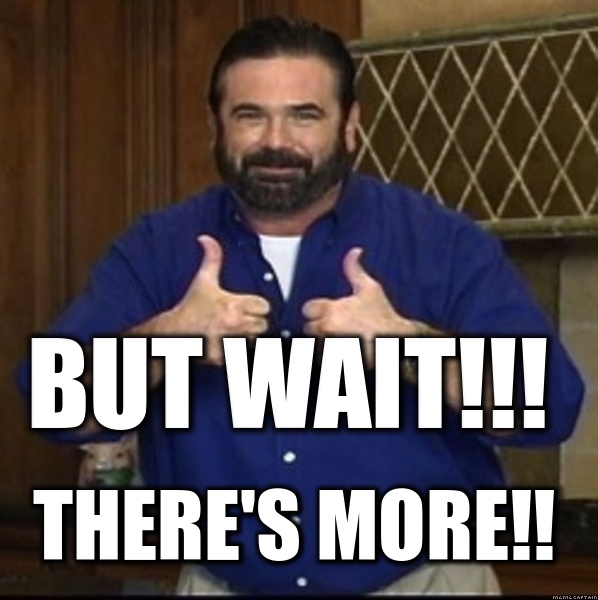 We were thrilled that so many folks seemed to like our big BookNotes list of Best Books of 2016 that we posted a week or more ago. Created in the rush of after-Christmas store sales and some early January travels, it was inevitable that I missed some that I wanted to name.
We were thrilled that so many folks seemed to like our big BookNotes list of Best Books of 2016 that we posted a week or more ago. Created in the rush of after-Christmas store sales and some early January travels, it was inevitable that I missed some that I wanted to name.
Further, there are a bunch that, even if I didn’t name them in the best of Honorable Mentions list, are still quite honorable; some that are beautifully written, truly interesting, maybe even important, or perhaps particularly wise. We so enjoyed reading, discussing, reviewing, and selling them this year. We’ve got thousands and thousands of books that come in during any given year but there are some that just stand out, that we really loved.
 And so, these are the runner-ups, shall we say, those deserving an extra shout out, books and authors that helped make 2016 a great year for the sorts of books you find at Hearts & Minds. There’s something for nearly everyone, I’d say. We love reading widely and highlighting the best of various sorts of authors and styles and views. (Still no novels, though… still working on that. It’s difficult!)
And so, these are the runner-ups, shall we say, those deserving an extra shout out, books and authors that helped make 2016 a great year for the sorts of books you find at Hearts & Minds. There’s something for nearly everyone, I’d say. We love reading widely and highlighting the best of various sorts of authors and styles and views. (Still no novels, though… still working on that. It’s difficult!)
Here is what you can think of as a BookNotes Extra — more great books that we just had to list from the year of 2016 AD. In no particular order… all on sale. Use our secure order form page at the website by following the link below. Spread the word. We’d love to sell some of these here in the early weeks of 2017.
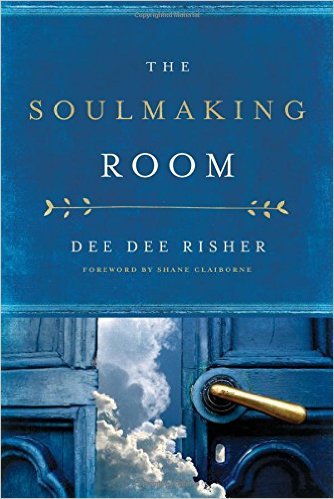 The Soulmaking Room Dee Dee Risher (Upper Room Books) $16.99 I really should have named this in the previous list as it truly was one of the most moving books I read last summer. Dee Dee Risher used to write for The Other Side magazine, a journal that was very influential in our lives, one we read up until it closed a decade ago. Committed to serious cultural engagement through the lens of the poor, the marginalized, and always looking for ways to make Christian discipleship and spirituality energetic and involved, the magazine and the intentional community that sustained it was something like, say, Sojourners, and early on they had much in common (and maybe some friendly competition in the post-evangelical peace and justice world of 80s and 90s, say. If Sojo got a bit bigger, telling stories of national interest with globally known writers, The Other Side seemed to double down, stay local, keeping it real in a very rough part of Philly. At the center of this ministry carried into the new millennium was the remarkably gifted writer and activist, Dee Dee Risher, a Southern, rural gal who found her way to China and then urban Philadelphia. The Soulmaking Room tells her story, a memoir that tells of her journey to be her most authentic self, being true to her convictions and her heart, forging a lifestyle of consistent, persistent resistances the principalities and powers.
The Soulmaking Room Dee Dee Risher (Upper Room Books) $16.99 I really should have named this in the previous list as it truly was one of the most moving books I read last summer. Dee Dee Risher used to write for The Other Side magazine, a journal that was very influential in our lives, one we read up until it closed a decade ago. Committed to serious cultural engagement through the lens of the poor, the marginalized, and always looking for ways to make Christian discipleship and spirituality energetic and involved, the magazine and the intentional community that sustained it was something like, say, Sojourners, and early on they had much in common (and maybe some friendly competition in the post-evangelical peace and justice world of 80s and 90s, say. If Sojo got a bit bigger, telling stories of national interest with globally known writers, The Other Side seemed to double down, stay local, keeping it real in a very rough part of Philly. At the center of this ministry carried into the new millennium was the remarkably gifted writer and activist, Dee Dee Risher, a Southern, rural gal who found her way to China and then urban Philadelphia. The Soulmaking Room tells her story, a memoir that tells of her journey to be her most authentic self, being true to her convictions and her heart, forging a lifestyle of consistent, persistent resistances the principalities and powers.
The publicity for the book tells us: The Soulmaking Room addresses the spiritual challenges of the middle years. For many people, these years bring failure, uncertainty, and losses. Dee Dee Risher probes how struggles, losses, failures, and pain can actually result in a spiritually whole, authentic life. In this personal, funny, and vulnerable narrative, Risher is unrelentingly honest about money, race, marriage, class, parenting, and spirituality. This powerful, poetic book shows how grappling with universal experiences of human life can make people more resilient, deeper, and truer to their identity. The Soulmaking Room is for anyone who wants to look life right in the eye and come out more whole.
As part of the theme of the book, Risher beautifully weaves her own story with the story in the Scriptures of the prophet Elisha and the Shunammite woman, from which the book gets it title. Risher sees in this woman from Shunem hospitality and risk, bold generosity and honest vulnerability.
Her friend, Jim Wallis, of Sojourners, writes:
Once in a great while, you come across a book that reflects the very personal journey of its author, yet also offers profound insights to a wide variety of readers. Dee Dee Risher has accomplished this feat with lyricism, grace, deep pathos, and unexpected joy. The humble wisdom Dee Dee offers in this book is something I would recommend to anyone who seeks to live more authentically and intentionally in our wonderful, mysterious, broken world, so loved by God.
The fun forward is graciously written by a younger generation friend, Shane Claiborne, with whom Risher has worked. (She now is associate communications director for Project HOME, a nonprofit working to end homelessness in Philadelphia. She worked with Shane to help launch Conspire magazine.
After some lovely and fascinating words of tribute and setting context, Shane says she is a legend. But that not many know her. After describing her journey, though, he then says:
One of the things you will discover as you read her book is that Dee Dee is wonderfully ordinary. She has certainly seen the world from her work in North Carolina to her time in China, but at the end of the day she is a mother, a courageous wife, a middle-aged freedom fighter who knows that most days of the revolution are from from spectacular. I think you, like me, will find yourself in her story. Our stories are gifts we share with one another and with the world. And when we share them, something magical happens. We remind one another that we are not alone as we heal from our wounds and as we dream of a better world. By sharing our own story, we help others write theirs. That is what Dee Dee Risher has done.
And she has done it with great grace, hard-learned skill of wondrous storytelling and fine writing, and with a broad vision of God’s better world, breaking into our ordinary days. One of the best books of the year.
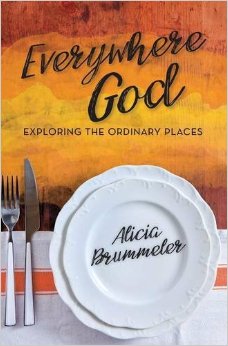 Everywhere God: Exploring the Ordinary Places Alicia Brummeler (Kalos Press) $14.99 I discovered this book late in the year and you may not have heard of it, even though the publisher, Kalos Press, should be better known for doing fine and thoughtful, nearly literary works created out of a Christian worldview. This book is wonderful in many ways but has as its main burden the task of overcoming vestiges of an older and unfaithful assumption about a split between the so-called sacred and secular. That is, this author is giving us stories from her life about how to encounter God in the ordinary, how to think realistically and beautifully about the goodness and brokenness that pervades our common life. When I realized that she was been influenced by the writings of Edith Schaeffer I was very excited. When I saw the blurb by Random Fellowship writer Margie Haack, I knew this woman must be very special, very honest, and probably a lot of fun to be around.
Everywhere God: Exploring the Ordinary Places Alicia Brummeler (Kalos Press) $14.99 I discovered this book late in the year and you may not have heard of it, even though the publisher, Kalos Press, should be better known for doing fine and thoughtful, nearly literary works created out of a Christian worldview. This book is wonderful in many ways but has as its main burden the task of overcoming vestiges of an older and unfaithful assumption about a split between the so-called sacred and secular. That is, this author is giving us stories from her life about how to encounter God in the ordinary, how to think realistically and beautifully about the goodness and brokenness that pervades our common life. When I realized that she was been influenced by the writings of Edith Schaeffer I was very excited. When I saw the blurb by Random Fellowship writer Margie Haack, I knew this woman must be very special, very honest, and probably a lot of fun to be around.
Here’s what Margie (author of her own wonderful collection of essays called God in the Sink) writes on the inside of the cover:
For a younger generation of people who see to unite the parts of their life once defines as sacred versus secular, Everywhere God examines this dichotomy and encounters God in all parts of life. From parenting to the workplace the author’s journey take us deep into everyday life where we find God present on every level. A great strength of this book are the questions and outstanding resources at the end of each chapter that invite readers into further discussion and reflection.
Here are the chapter titles after a very fine opening one:
Encountering God in Creation
Encountering God in Literature
Encountering God in Hospitality
Encountering God in Rituals
Encountering God When Spiritually Adrift
Encountering God as a Caregiver
Encountering God in the Workplace
Encountering God in Community.
As Margie suggested, each section not only has Alicia’s ruminations, her own stories of leaning into these aspects of discipleship, these common place practices that open up life and joy and spirituality, but then some really good listings of further readings, books or films to pursue to deepen one’s attentiveness in that area. These are all themselves wonderful — I rather compulsively read those parts first, and was not only encouraged but inspired. A very nice little book, wise and thoughtful and lovely.
I think Andrea Palpant Dilley, contributing editor for Christianity Today (and author of the wonderful, deeply moving memoir, God and Other Flat Tires), is correct when she notes:
This practical, insightful book is perfect for book groups, small groups, and individual readers who are hungry to find God’s sacred presence in the ordinary.
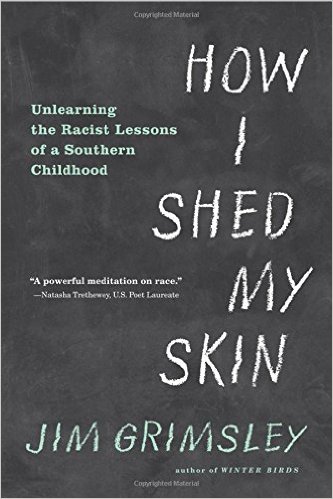 How I Shed My Skin: Unlearning the Racist Lessons of a Southern Childhood Jim Grimsley (Algonquin Books) $16.95 Algonquin is known as a publisher that only releases the finest writers and they often do good stuff that is particularly Southern. Although this book came out in ’15, we didn’t discover it until ’16 and it became one of the most thought-provoking books I read all year. I recall reviewing it at BookNotes and trying to explain how moving it was, how well written, and how this author shows — in a thoroughly enjoyable memoir — how racism can be learned and, in some ways, unlearned.
How I Shed My Skin: Unlearning the Racist Lessons of a Southern Childhood Jim Grimsley (Algonquin Books) $16.95 Algonquin is known as a publisher that only releases the finest writers and they often do good stuff that is particularly Southern. Although this book came out in ’15, we didn’t discover it until ’16 and it became one of the most thought-provoking books I read all year. I recall reviewing it at BookNotes and trying to explain how moving it was, how well written, and how this author shows — in a thoroughly enjoyable memoir — how racism can be learned and, in some ways, unlearned.
Grimsley tells of being in the first inter-racial class that started out together and graduated together (in 1973, in Jones County North Carolina) after the passage of the Freedom of Choice Act. Late in the book he attends (segregated) class reunions and ponders how his life has ended up, and why the country is still so deeply torn about matters of race. As a Southern gay man, he has some particular insights, too, about assumptions and biases and caring about others. This is eloquent, moving, thoughtful, a great book to read together.
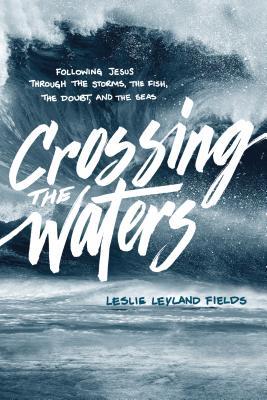 Crossing the Water: Following Jesus Through the Storms, The Fish, the Doubt and the Seas Leslie Leyland Fields (NavPress) $15.99 The day my “Best Books of 2016” post went live I got my first email reply and it was a customer raving about this, his favorite book of the year. I suppose he was wondering why I hadn’t listed it since I had so enthusiastically endorsed it at BookNotes earlier in the year, and to him, as a good read he’d enjoy.
Crossing the Water: Following Jesus Through the Storms, The Fish, the Doubt and the Seas Leslie Leyland Fields (NavPress) $15.99 The day my “Best Books of 2016” post went live I got my first email reply and it was a customer raving about this, his favorite book of the year. I suppose he was wondering why I hadn’t listed it since I had so enthusiastically endorsed it at BookNotes earlier in the year, and to him, as a good read he’d enjoy.
I can’t answer that, but I certainly am happy to take this opportunity to rectify the oversight. This is on a number of people’s “best books” of the year, and we’d heard good things from those who took us up on our encouragement to read it. Here is what I wrote at BookNotes last month:
What a grand and surprising book this is — one you could happily give to any number of folks. Fields is a remarkable writer, very talented and very wise. (I adored the collected she edited The Spirit of Food and really appreciate her excellent book on the myths of parents and many have been helped by her Forgiving Our Fathers and Mothers.) She is, by vocation, not only a writer, but a fisher-person doing her work with her family on a remote island off the coast of the mainland in Alaska. This book includes some vivid telling of her wild experiences — dramatically wet and wild, scary, even — fishing in the dangerously cold seas of the Pacific Northwest. But here’s the thing: besides being a woman’s wilderness memoir and story of life in Alaska, it is also a study of faith. And, quite literally, a study of fishing in the Bible.
Early in the unfolding of this great book, Leyland Fields makes a trek, nearly a pilgrimage, to the Middle East, to fish in the sea of Galilee. And there it gets really interesting, offering what the publisher says is “the wettest, stormiest, wildest trip through the gospels you’ve ever taken.”
Do you recall the classic little book, so loved by so many decades ago, called A Shepherd Looks at the 23rd Psalm (by Philip Keller, which is still in print, by the way>) In a way, this is a look at the disciples — fisherman that they were — by a woman well acquainted with nets and salt water and storms and fish on the beach. I think Crossing the Waters is a tremendous book, what reviewer Mark Galli calls “a rare gift.”
He continues, “It pulses with story and theology, with lived suffering and quiet joy, with vast mysteries and a strong Savior.”
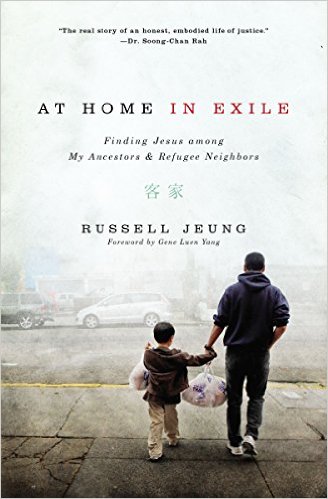 At Home in Exile: Finding Jesus Among My Ancestors & Refugee Neighbors Russell Jeung (Zondervan) $17.99 This is another exception book that we’ve seen this year, a spiritual memoir of a unique sort. With the tragic refugee crisis emerging in the last year or so we are paying a bit more attention to the stories of refugees, immigrants, and others who are exiled or homeless. We stock a number of helpful books trying to help us want to offer Christ-like compassion and develop a Biblically-informed perspective on immigration issues, but this is not one of those. This is a story — joyful and at times harrowing — of living in East Oakland (in a neighborhood ominously called Murder Dubs) where he has to battle drug dealers who threaten him, exorcising a spirit possessing a teenager, and the big story of joining with 200 Cambodian and Latino friends and winning a landmark housing settlement against slumlords.
At Home in Exile: Finding Jesus Among My Ancestors & Refugee Neighbors Russell Jeung (Zondervan) $17.99 This is another exception book that we’ve seen this year, a spiritual memoir of a unique sort. With the tragic refugee crisis emerging in the last year or so we are paying a bit more attention to the stories of refugees, immigrants, and others who are exiled or homeless. We stock a number of helpful books trying to help us want to offer Christ-like compassion and develop a Biblically-informed perspective on immigration issues, but this is not one of those. This is a story — joyful and at times harrowing — of living in East Oakland (in a neighborhood ominously called Murder Dubs) where he has to battle drug dealers who threaten him, exorcising a spirit possessing a teenager, and the big story of joining with 200 Cambodian and Latino friends and winning a landmark housing settlement against slumlords.
The back cover says,
More poignantly, At Home in Exile weaves in narratives of longing and belonging as Jeung retraces the steps of his Chinese-Hakka family and his refugee neighbors. In the face of forced relocation and institutional discrimination, his family and friends resisted time and again over six generations.
Dr. Jeung has spent over two decades working in refugee resettlement when he came to realize that he, too, was an exile. “And this exilic identity, as a “stranger and foreigner,” provides wisdom and hope for all Christians engaging in the major societal issues of our day: mass displacement and poverty, racism, and persistent inequality.”
Dr. Russell Jeung is a leading sociologist of Asian Americans and race and is a professor of Asian American Studies at San Francisco State University. Kudos to Zondervan for bringing this fascinating memoir to us and for tackling such topics with insight and grit and grace. All proceeds of At Home in Exile will go to New Hope Covenant Church’s ministries for refugee families.

Mark Boone, the other editor, by the way, is a philosophy prof who has a scholarly work on Augustine and his understanding of desire called The Conversion and Therapy of Desire: Augustine’s Theology of Desire in the Cassiciacum Dialogues. I read as much as I could and it was very learned, very fluent in the literature on the big A, considered an important contribution. Just saying, these guys are super smart and this book is serious. And how about that cool, retro cover? Awesome!
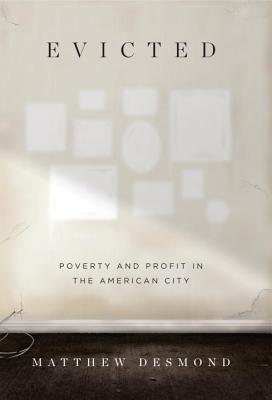 Evicted: Poverty and Profit in the American City Matthew Desmond (Crown) $28.00 Anyone who reads reviews about books exploring current events on contemporary issues has most likely seen very positive reviews of this major work. From Barbara Ehrenreich (“Astonishing. Desmond has set a new standard for reporting on poverty”) to Rebecca Skloot, author of The Immortal Life of Henrietta Lacks, who says it is “beautiful, harrowing, and deeply human” and “a must-read for anyone who cares about social justice in this country.” It is very well researched and has been commended by the best social scientists and urban activists, including the eminent Harvard professor William Julius Wilson. Evicted is a powerful study of economic hardship and life on the margins
Evicted: Poverty and Profit in the American City Matthew Desmond (Crown) $28.00 Anyone who reads reviews about books exploring current events on contemporary issues has most likely seen very positive reviews of this major work. From Barbara Ehrenreich (“Astonishing. Desmond has set a new standard for reporting on poverty”) to Rebecca Skloot, author of The Immortal Life of Henrietta Lacks, who says it is “beautiful, harrowing, and deeply human” and “a must-read for anyone who cares about social justice in this country.” It is very well researched and has been commended by the best social scientists and urban activists, including the eminent Harvard professor William Julius Wilson. Evicted is a powerful study of economic hardship and life on the margins
I’ve not finished it but I can assure you that it is very thoughtful and very moving; well-written seems a cliche to describe this non-fiction prose. One reviewer said is it “exquisitely crafted.”
And, it is very, very important. Don’t take my word for it; Carlos Lozada writes just about the best thing that can be said of a non-fiction advoacy book, in the Washington Post, no less:
An extraordinary feat of reporting and ethnography. Desmond has made it impossible to ever again consider poverty in America without tackling the role of housing — and without grappling with Evicted.
I am sorry I didn’t list this in the Best of 2016 and now that I’m reading it, I see why it was on so many other mainstream lists.
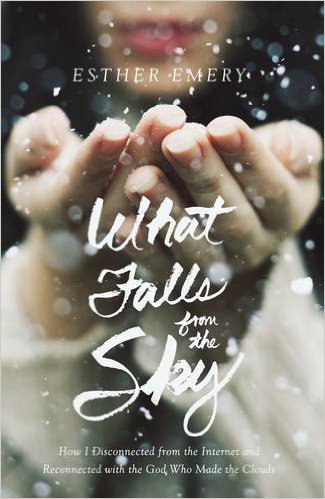 What Falls from the Sky: How I Disconnected from the Internet and Reconnected with the God Who Made the Clouds Esther Emery (Zondervan) $19.99 This handsome-looking books with an evocative snowy cover arrived the week before Christmas and we put it on our “new release” table and eyed it up from time to time. It sure looked inviting but, to be fully honest, I’d had enough of the “I’m getting off the internet” genre — see Christina Crook’s The Joy of Missing Out: Finding Balance in a Wired World for one of the most thoughtful or, say, The Wired Soul: Finding Spiritual Balance in a Hyperconnected Age by Tricia McCary Rhodes for a truly lovely reflection.) I have to admit I don’t like the all or nothing approach this book offers and, hey, anyway, if somebody goes off line, how will they read my book reviews? So, let’s not go overboard here, people.)??The other day I opened this book to see endorsements hidden inside. As you may know, these kinds of blurbs mean a lot to me — they usually tell you what orbit an author is in, and the advanced reviewers give you a hint by what they say (or don’t say) about both the content and the quality of the pages to come.
What Falls from the Sky: How I Disconnected from the Internet and Reconnected with the God Who Made the Clouds Esther Emery (Zondervan) $19.99 This handsome-looking books with an evocative snowy cover arrived the week before Christmas and we put it on our “new release” table and eyed it up from time to time. It sure looked inviting but, to be fully honest, I’d had enough of the “I’m getting off the internet” genre — see Christina Crook’s The Joy of Missing Out: Finding Balance in a Wired World for one of the most thoughtful or, say, The Wired Soul: Finding Spiritual Balance in a Hyperconnected Age by Tricia McCary Rhodes for a truly lovely reflection.) I have to admit I don’t like the all or nothing approach this book offers and, hey, anyway, if somebody goes off line, how will they read my book reviews? So, let’s not go overboard here, people.)??The other day I opened this book to see endorsements hidden inside. As you may know, these kinds of blurbs mean a lot to me — they usually tell you what orbit an author is in, and the advanced reviewers give you a hint by what they say (or don’t say) about both the content and the quality of the pages to come.
And there it was, rave reviews from creative writers I admired: Amy Boucher Pye, Preston Yancey, Addie Zierman, Jen Pollock Michel. And, of course, Christian Cook, who says:
Esther Emery’s What Falls from the Sky is a joyful pilgrimage into the heart of what matters in a complex and connected world. With wit and wisdom, she takes us on a wholehearted journey of an embodied faith: a faith where heart and hands, mind and body matter equally and the truth of Scripture is confirmed in the truth of the earth. What Falls from the Sky is not to be missed.
And then I saw this enticing blurb by Elizabeth Esther who wrote the amazing Girl at the End of the World:
I tore through this book like the pages were on fire. Esther Emery’s courageous, gritty, and self-aware experiment with fasting from the Internet is nothing less than a freedom song.
And so, late last night, with too much to do and my own internet compulsions to contend with, I, too was tearing through the pages of this marriage in disarray, this story of faith and growth and freedom and recovery. What a book! I was — I am not exaggerating — hooked by the first page. What Falls from the Sky is arranged around four seasons of trying to stop the chaos of her life by getting rid of her electronic devices and screens, but there is more. We hear about her self discovery, her growing into a new found faith, her mothering of two young kids, her renewed romance with her husband, it’s all here, told in unbelievably great, dramatic, prose. Maybe you have read Present Over Perfect by the deservingly popular Shauna Niequist. This one is for you, struggling to calm the waters, learn to be present, but hold on. The writing is mature, feisty, strong, raw and I commend this artfully told tale to anyone who likes good memoir, who wants well-crafted writing, who needs to explore a life slowly, slowly, learning to be well lived. One of the best memoirs I’ve read in a long time.
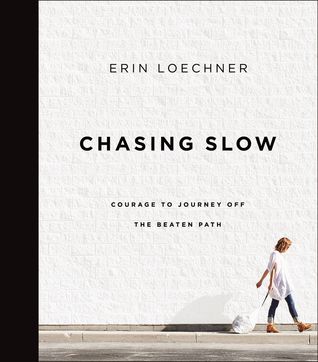 Chasing Slow: Courage to Journey Off the Beaten Path Erin Loechner (Zondervan) $24.99 I had an advanced copy of this and was really, really excited to see how it would actually look — there were already hints that it was going to be a very modern look. But didn’t see the real lay out and full color design until just before the new year. This, it seems to me, ought to be a 2017 release — fresh, new, helpful, a perfect example of an applied faith lived out with artful intention for those making new declarations. Chasing Slow is a book which surely deserves to be named as the best designed and most handsome Christian book of many a year. That the author herself is a former art director and stylist in Los Angeles and a HGTV.com star (and that she written for Elle Decor, Mari Claire, Dwell, and her work showcased in The New York Times) gives us a clue: this book is about designing one’s life, learning to slow down and think well, trusting that we will be given all that we need. In some sense the sturdy but gorgeous packaging is part of the message.
Chasing Slow: Courage to Journey Off the Beaten Path Erin Loechner (Zondervan) $24.99 I had an advanced copy of this and was really, really excited to see how it would actually look — there were already hints that it was going to be a very modern look. But didn’t see the real lay out and full color design until just before the new year. This, it seems to me, ought to be a 2017 release — fresh, new, helpful, a perfect example of an applied faith lived out with artful intention for those making new declarations. Chasing Slow is a book which surely deserves to be named as the best designed and most handsome Christian book of many a year. That the author herself is a former art director and stylist in Los Angeles and a HGTV.com star (and that she written for Elle Decor, Mari Claire, Dwell, and her work showcased in The New York Times) gives us a clue: this book is about designing one’s life, learning to slow down and think well, trusting that we will be given all that we need. In some sense the sturdy but gorgeous packaging is part of the message.
Loechner has seen her share of heartbreak — her husband’s brain tumor, bankruptcy, family loss, and public criticism. In Chasing Slow she says she wants to guide folks to a new lifestyle “on that will refresh your perspective, renew your priorities, and shift your focus to the journey that matters most.”
This very cool book is divided into two parts: Part One is called “Chasing More.” Part Two is called (yep, you’ve got it) “Chasing Slow.”
As Hayley Morgan, author of Wild and Free says,
Erin’s way of thinking shows the fruit of living slowly. She pulls at every string, peeks beneath every layer. She connects the dots of how so many of us are feeling, putting words to questions we’re only just beginning to ask. This book is beautifully written, and you’ll want to savor it.
And, you’ll learn about some ethical shopping sites, like Zady.
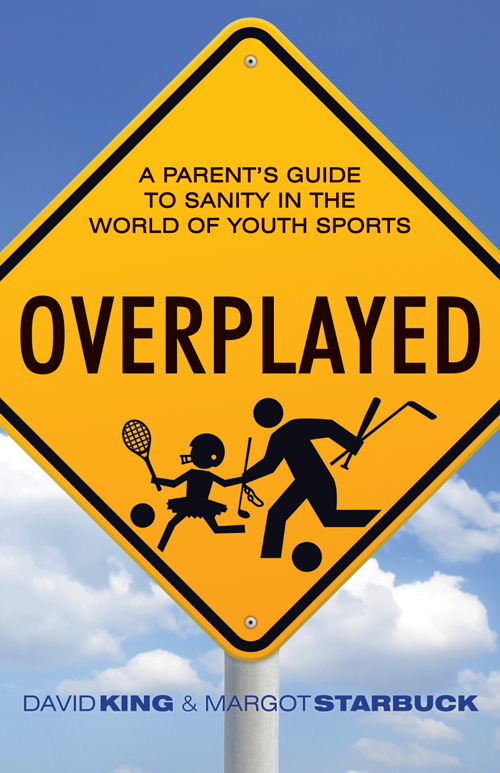 Overplayed: A Parent’s Guide to Sanity in the World of Youth Sports David King & Margot Starbuck (Herald Press) $15.99 I agree with John R. Gerdy (author of Ball or Bands) who says “This book is a must-read for parents. It offers solid, helpful suggestions as to how we can, once again, make youth sports about the kids.”
Overplayed: A Parent’s Guide to Sanity in the World of Youth Sports David King & Margot Starbuck (Herald Press) $15.99 I agree with John R. Gerdy (author of Ball or Bands) who says “This book is a must-read for parents. It offers solid, helpful suggestions as to how we can, once again, make youth sports about the kids.”
I cheered this one on when it first came out because I know oodles of parents, and you do too, who are struggling with this question. And I cheered this one on because I know lots of others — pastors, Christian educators, teachers and mentors and aunts and uncles — who all are concerned about the young ones in their lives who seem to being sucked in to a way of life that isn’t healthy or, even, always very fun. What are we to do?
I also cheered this on because I read the first several books of Margo Starbuck and loved every last page of each one. If Margo is behind something, I’m in.
This problem of being “overplayed” wasn’t a problem in our own household as our own kids were coming up, and but I read this anyway, in part because I know it is a pressing matter and in part because I wanted to see what King and Starbuck did. It’s a fabulous book, a great resource — not at all anti-sports, by the way (King is the Athletics Director at a Christian university and has thought about this stuff a lot.) It deserves to be widely known because it is deeply Christian but could be read by nearly anyone, has some good, healthy thinking about recreation and fun and family, but also because it is very practical. With “Eight questions to discuss on the way home from the game” and “Five Ways to Ruin Your Child’s Sport’s Experience” and Dinnertime conversation starters about your family’s values, this helps you figure out how to address this matter. There is a Q&A section at the end of each chapter and some bonus tips for coaches, parents, and churches. Overplayed will help solve some of your problems about how to deal. Order some today.
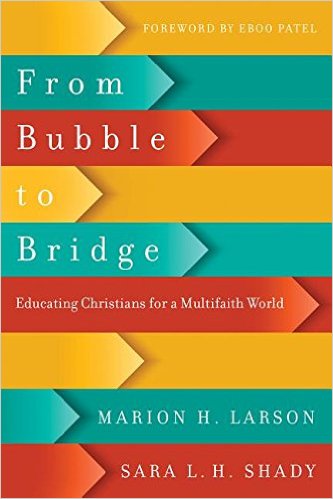 From Bubble to Bridge: Educating Christians for a Multi-Faith World Marion Larson & Sarah L.H. Shady (IVP Academic) $19.99 There are dozens of books on Christian faith and world religions; some are more classically liberal almost glibly over-estimating our unity and commonalities. Some are so eager to testify to the uniqueness of Christ that they are nothing but rants against Everybody. Some are balanced, thoughtful, careful., showing how historic, Biblical Christian faith compares and contrast with other world religions. (By the way, for the record, I often suggest the very interesting book by Stephen Prothero God Is Not One: The Eight Rival Religions That Run the World as a non-partisan overview of the distinctives.) Anyway, although there are many solid handbooks to world faiths and many that are evangelically minded and reliable, I’ve not found one that does what this new one does. It is, in a way, nearly historic, to see such a nuanced and thoughtful work stepping into the fray.
From Bubble to Bridge: Educating Christians for a Multi-Faith World Marion Larson & Sarah L.H. Shady (IVP Academic) $19.99 There are dozens of books on Christian faith and world religions; some are more classically liberal almost glibly over-estimating our unity and commonalities. Some are so eager to testify to the uniqueness of Christ that they are nothing but rants against Everybody. Some are balanced, thoughtful, careful., showing how historic, Biblical Christian faith compares and contrast with other world religions. (By the way, for the record, I often suggest the very interesting book by Stephen Prothero God Is Not One: The Eight Rival Religions That Run the World as a non-partisan overview of the distinctives.) Anyway, although there are many solid handbooks to world faiths and many that are evangelically minded and reliable, I’ve not found one that does what this new one does. It is, in a way, nearly historic, to see such a nuanced and thoughtful work stepping into the fray.
The authors both have PhDs and teach at Bethel University in St. Paul, MN. They believe that “understanding our religious neighbors is more important than ever — but also more challenging.” Why that is is part of what this book is about — understanding the deep religious strife and the ever-increasing pluralism, and responding faithfully with hospitality and warmth and clarity about the Christian faith.
Interfaith dialogue has been critiqued (often properly so) as a mere nicety, without much robust conversation or desire for evangelism. That has sometimes been a caricature, but especially those on the more conventional theological traditions will be very glad that this book does not lapse towards sentimentality or mere dialogue.
Brian Howell of the theologically conservative Wheaton College says “From Bubble to Bridge arrives just in time… Larson and Shady have given us just what we need to grow our ethic of love across religious boundaries.”
If there is anybody I trust on this matter it is the globally-experience church historian and advocate of Christian scholarship, Joel Carpenter of Calvin College. Dr Carpenter says,
Interfaith dialogue has been happening for a long time, whether or not evangelicals have participated. So what might evangelicals bring to the table, other than a guilty conscience for coming rather late? From Bubble to Bridge offers an answer: their activism! These evangelical scholars ask, can dialogue help people of differing faiths get along better as neighbors? If that is not a cardinal aim, they insist, then dialogue seems rather sterile. So the authors set out a model of interfaith engagement. They endorse dialogue, yes, but beyond that, cooperation?out of mutual caring for the common good. Given the conflicts, tensions, and passions of our day, this book is very timely, very much needed.
Listen to Douglas Jacobsen and Rhonda Hustedt Jacobsen of Messiah College, co-directors of the Religion in the Academy Project:
Religious conflicts often dominate today’s headlines, and Christian colleges are faced with the challenge of preparing students to live faithfully and graciously as followers of Jesus in a world where peace and good will among people of differing faiths is desperately needed. From Bubble to Bridge explains what’s at stake, analyzes the difficulties, and maps a positive path forward. Engaging, well-organized, and overflowing with practical wisdom, this is the guide to interfaith relations that evangelical educators have been seeking.
This book is designed, for starters, to use as a book to help inform and teach young adults at Christian colleges. (Curtiss Paul DeYoung of the Community Renewal Society in Chicago says it should be “required reading at all Christian colleges.”) And I hope a few of our friends in campus ministry and in higher education order it from us. But I think it deserves a wider readership and although it isn’t simple, it is for ordinary folks everywhere who want to dig deep with open hearts. I’m a fan of this project, glad for this bold plan, and highly recommend this as one of the finest contributions to this topic in years.
 Kierkegaard: A Single Life Stephen Backhouse (Zondervan) $24.99 Who knew that there wasn’t a singular fine biography of the depressed Danish philosopher that was informative and interesting and accessible? Now we have it, an introductory bio, wonderfully-written, highly-regarded, a fresh look into the life and teachings of a scholar who is cited as one of the primary thinkers of the last century. Along with the likes of Einstein Freud, Darwin, Marx, Kierkegaard is one of those geniuses who have left their mark, for good or for ill. This book explains why that was and why we should care.
Kierkegaard: A Single Life Stephen Backhouse (Zondervan) $24.99 Who knew that there wasn’t a singular fine biography of the depressed Danish philosopher that was informative and interesting and accessible? Now we have it, an introductory bio, wonderfully-written, highly-regarded, a fresh look into the life and teachings of a scholar who is cited as one of the primary thinkers of the last century. Along with the likes of Einstein Freud, Darwin, Marx, Kierkegaard is one of those geniuses who have left their mark, for good or for ill. This book explains why that was and why we should care.
The blurbs on the back are from Rowan Williams, Stanley Hauerwas, William Cavanaugh, and Richard Beck of Abilene Christian University. Not too shabby. It deserves to be named in any list of notable books in 2016.
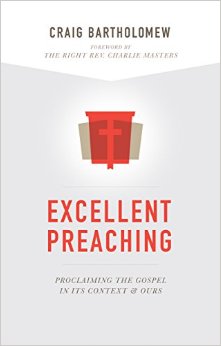 Excellent Preaching: Proclaiming the Gospel In Its Context & Ours Craig Bartholomew (Lexham Press) $11.99 We have dozens of new books on preaching — homiletics, as we say when we want to sound smart — and I get a kick out of reading them. I skim and become familiar with many and they seem to fall into a couple of categories: some are rather curious, academic, drawing on some often eccentric scholarly theory or rhetorical school of thought. We’ve got ’em, but nobody ever buys them. Then there are more useful ones, designed to help pastors preach better, more faithfully and with more passion and interest. These can be thoughtful or simplistic, more liberal or more conservative, but they are usually practical. Some are quite clever.
Excellent Preaching: Proclaiming the Gospel In Its Context & Ours Craig Bartholomew (Lexham Press) $11.99 We have dozens of new books on preaching — homiletics, as we say when we want to sound smart — and I get a kick out of reading them. I skim and become familiar with many and they seem to fall into a couple of categories: some are rather curious, academic, drawing on some often eccentric scholarly theory or rhetorical school of thought. We’ve got ’em, but nobody ever buys them. Then there are more useful ones, designed to help pastors preach better, more faithfully and with more passion and interest. These can be thoughtful or simplistic, more liberal or more conservative, but they are usually practical. Some are quite clever.
Most attempt but don’t do much with the deepest context of the twenty-first century listener, the ethos and idols of the culture we find ourselves in. (I commend Timothy Keller’s Preaching: Communicating Faith in an Age of Skepticism especially for chapter five that gives an overview of Charles Taylor to help us understand the late modern secular person.) Craig Bartholomew is a first class, world-respected Biblical scholar but he is also a bit of a cultural critic: by day he is the H. Evan Runner Professor of Philosophy at Redeemer University in Ancaster, Ontario. He is also the dean of the St. George’s Centre for Biblical and Public Theology. He is perhaps most known for being the co-author of The Drama of Scripture and the abridged version of that classic, the slimmer True Story of the Whole World. (If you pick up shades of Newbigin there, you are correct) and a whole bunch of scholarly Biblical works.
This little book helps us learn to understand the Biblical text and although it is brief, it is really, really helpful. And it helps us learn to communicate well the bigger story of God’s redemptive plan, the unfolding story of creation/fall/redemption/restoration, even as we are grounded in Scripture and proclaiming to an audience that may or may not be fully formed into the ways of Christ’s Kingdom. For a short, passionate argument about the need for and nature of effective preaching, this book (and it’s fine footnotes) deserves to be on the top of any preacher’s list.
Bruce Riley Ashford (author of Every Square Inch) summarizes it well:
…along the way he teaches the reader how to view a biblical text within the context of the whole biblical narrative, preach it in a way that draws hearers closer to God and at the same time sends them out into the world, and apply it to the prevalent idolatries of our time.
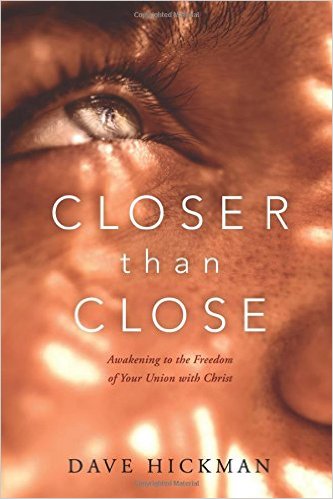 Closer Than Close: Awakening to the Freedom of Your Union With Christ Dave Hickman (NavPress) $14.99 I have recently re-read this splendid book and was, again, moved by his honest teaching about grace and the goodness of God and how our being one with Christ is the key to understanding our salvation and our ongoing growth and spiritual maturity. It is down-to-Earth and not overly academic and perhaps that is why I didn’t list it among the top books of 2016. I think I should have — when he talks about weeping after reading a quote by Brennan Manning and tells of his friendship with Fil Anderson (whose Running on Empty told a similar story of ministry burnout and longing for inner transformation through more deeper awareness of God’s presence) I just knew that this is one of the very good books of this year. I’ve enjoyed telling folks about it, glad for our little connection through mutual friends at Montreat College in North Carolina, and I sincerely want to give an honorable mention to Dave Hickman for offering us this reminder of what the life of faith is about, how we are closer to God — really closer — than we know.
Closer Than Close: Awakening to the Freedom of Your Union With Christ Dave Hickman (NavPress) $14.99 I have recently re-read this splendid book and was, again, moved by his honest teaching about grace and the goodness of God and how our being one with Christ is the key to understanding our salvation and our ongoing growth and spiritual maturity. It is down-to-Earth and not overly academic and perhaps that is why I didn’t list it among the top books of 2016. I think I should have — when he talks about weeping after reading a quote by Brennan Manning and tells of his friendship with Fil Anderson (whose Running on Empty told a similar story of ministry burnout and longing for inner transformation through more deeper awareness of God’s presence) I just knew that this is one of the very good books of this year. I’ve enjoyed telling folks about it, glad for our little connection through mutual friends at Montreat College in North Carolina, and I sincerely want to give an honorable mention to Dave Hickman for offering us this reminder of what the life of faith is about, how we are closer to God — really closer — than we know.
I reviewed it well in a previous BookNotes, but I didn’t tell much about the introduction by Fil Anderson. Since it is there, I guess it is good to share it. Listen to this, as Anderson tells of his first meeting with Dave:
Despite my knowing that his life was spinning out of control, our initial encounter was more unsettling than I had anticipated. Immediately after he was seated in the cozy, quiet confines of my study, he nervously explained the cause for his sudden, brief, and repetitive movements that already were threatening my ability to listen.
Diagnosed with Tourett’s syndrome in the fourth grade, David had also suffered the debilitating effects of obsessive-compulsive disorder, attention-deficit disorder, and anxiety and depression. Ever since, he had lived with an impeding sense of doom. While asleep, he would sweat profusely. Upon waking, he suffered from “anxiety induced vomiting.” For years he dreaded nighttime and despised the coming of morning even more. Yet most devastating were the secrets he kept about himself. Eventually he led me into the hidden harbors of his heart, where fear, insecurity, and discontent had dropped anchor, revealing how his sense of identity had been tethered to externals, causing his sense of self-worth to be continually endangered.
Anderson, his friend and spiritual director, continued:
David scorching honesty and humble transparency ravished my heart and brought me to tears. Despite the severity of his physical and emotional struggles, what had most plagued him was his soul’s desperate search for what he’d already been given. Clearly, the greatest discovery of his life was when David wok e up to the truth that he had been perfectly one with Christ since the day he gave his life to Christ.
David doesn’t talk that overtly in Closer Than Close about how dramatic his transformation was; the book is honest and at times poignant, but it is, again, for any of us. Knowing, though, his backstory makes it all that much more remarkable. Thanks be to God.
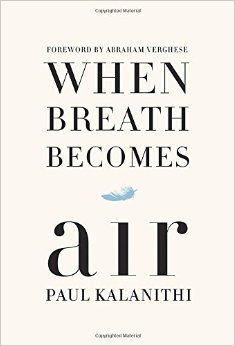 When Breath Becomes Air Paul Kalanithi (Random House) $25.00 I liked the look of this hand-sized hardback with embossed, textured cover and deckled pages and knew it was going to be nice. We put it in our large section of books about death and dying, grief and loss, and for a bit forgot about it. Later, I read a story from a New York Times Sunday Magazine article that was so beautifully written, by the soon-to-be widow of a dying doctor, that I cried and cried and sent it to Beth. Alas — yep — it was written by Lucy, Dr. Paul Kalanithi’s wife and it told of his efforts writing this book as he was ill, how she intended to finish it for him, the very book we had but I hadn’t looked at. Of course, we immediately paid more attention and realized this is a very exceptional book.
When Breath Becomes Air Paul Kalanithi (Random House) $25.00 I liked the look of this hand-sized hardback with embossed, textured cover and deckled pages and knew it was going to be nice. We put it in our large section of books about death and dying, grief and loss, and for a bit forgot about it. Later, I read a story from a New York Times Sunday Magazine article that was so beautifully written, by the soon-to-be widow of a dying doctor, that I cried and cried and sent it to Beth. Alas — yep — it was written by Lucy, Dr. Paul Kalanithi’s wife and it told of his efforts writing this book as he was ill, how she intended to finish it for him, the very book we had but I hadn’t looked at. Of course, we immediately paid more attention and realized this is a very exceptional book.
Paul was a good husband, a beloved doc, in training for ten years to be a neurosurgeon. He earned an MPhil in history and philosophy (from Cambridge!) and graduated cum laude from the Yale School of Medicine. But all of that only illustrates how smart he was, and what a gifted person he was. He was also a very, very good writer who loved great literature and a person who cared deeply about important things. He was diagnosed with stage IV lung cancer at the age of thirty-six.
As the book jacket tells us, “One day he was a doctor treating the dying, and the next he was a patient struggling to live.” It works with that theme a bit and is elegantly written; it is full of charm and pathos and insight and a quest for a meaningful life and a good death. The book eventually sky-rocketed to the top of the best-seller charts and not a few customers have told us it is one of the most deeply moving books they’ve ever read. As the important and artful writer Atul Gawande says, it is “Rattling, heartbreaking, and ultimately beautiful, the too-young Dr. Kalanithi’s memoir is proof that the dying are the ones who have the most to teach us about life.” Fiction writer, essayists and bookstore owner Ann Patchet says “This is one of the handful of books I consider to be a universal donor — I would recommend it to anyone, everyone.”
There are, by the way, a few pages in the middle which offer a beautiful rendering of his return to Christian faith after “a long stretch, following college, when my notion of God and Jesus had grown, to put it gently, tenuous.” His reflections about this part of his life are wonderfully written and encouraging. The whole book is very, very good and certainly one of the Best Books of 2016.
I wanted to note, also, that this has been a good year for books about hardship, trials, being honest about pain and lament. Most years bring us several good books about grief and pastoral care of the hurting, but there are a few that were outstanding this year, and I wanted to publicly thank the publishers for trusting these words full of pathos, for allowing writers to do this kind of work. For instance, if I could, I’d award all of these with some kind of blue ribbon.
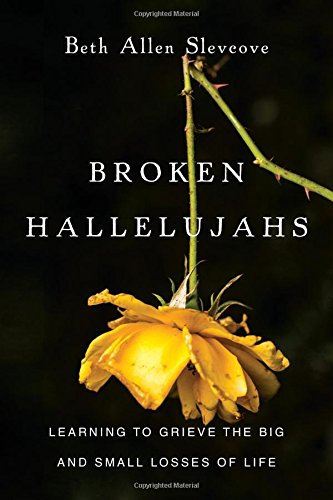 Broken Hallelujahs: Learning to Grieve the Big and Small Losses of Life Beth Allen Slevcove (IVP) $16.00 Beautifully written narration of this Lutheran spiritual director’s disappointments, losses, hardships, both minor and major. She searches for “hidden beauty in the dark” with candor and wit and grace. Excellent.
Broken Hallelujahs: Learning to Grieve the Big and Small Losses of Life Beth Allen Slevcove (IVP) $16.00 Beautifully written narration of this Lutheran spiritual director’s disappointments, losses, hardships, both minor and major. She searches for “hidden beauty in the dark” with candor and wit and grace. Excellent.
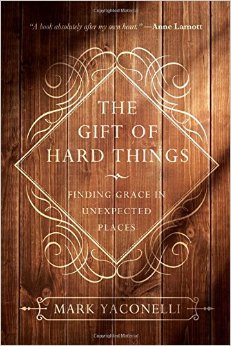 The Gift of Hard Things: Finding Grace in Unexpected Places Mark Yaconelli (IVP) $16.00 Whoah, what a book. Kenda Dean says “I am undone… The Gift of Hard Things is a book of dazzling grace, a slice of holy ground, as life giving as water in a desert.” Anne Lamott says “A book absolutely after my own heart…” Wow.
The Gift of Hard Things: Finding Grace in Unexpected Places Mark Yaconelli (IVP) $16.00 Whoah, what a book. Kenda Dean says “I am undone… The Gift of Hard Things is a book of dazzling grace, a slice of holy ground, as life giving as water in a desert.” Anne Lamott says “A book absolutely after my own heart…” Wow.
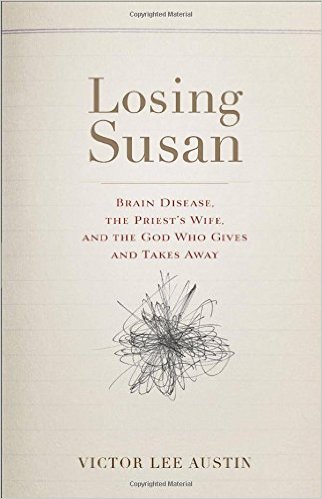 Losing Susan: Brain Disease, The Priest’s Wife, and the God Who Gives and Takes Away Victor Lee Austin (Brazos Press) $19.99 Austin is a scholar and priest and this is his eloquent testimony — “painfully truthful” as one reviewer put it, drawing on theological wisdom, without sentimentality. Some have compared it to the enduring memoir about grief of C.S. Lewis.
Losing Susan: Brain Disease, The Priest’s Wife, and the God Who Gives and Takes Away Victor Lee Austin (Brazos Press) $19.99 Austin is a scholar and priest and this is his eloquent testimony — “painfully truthful” as one reviewer put it, drawing on theological wisdom, without sentimentality. Some have compared it to the enduring memoir about grief of C.S. Lewis.
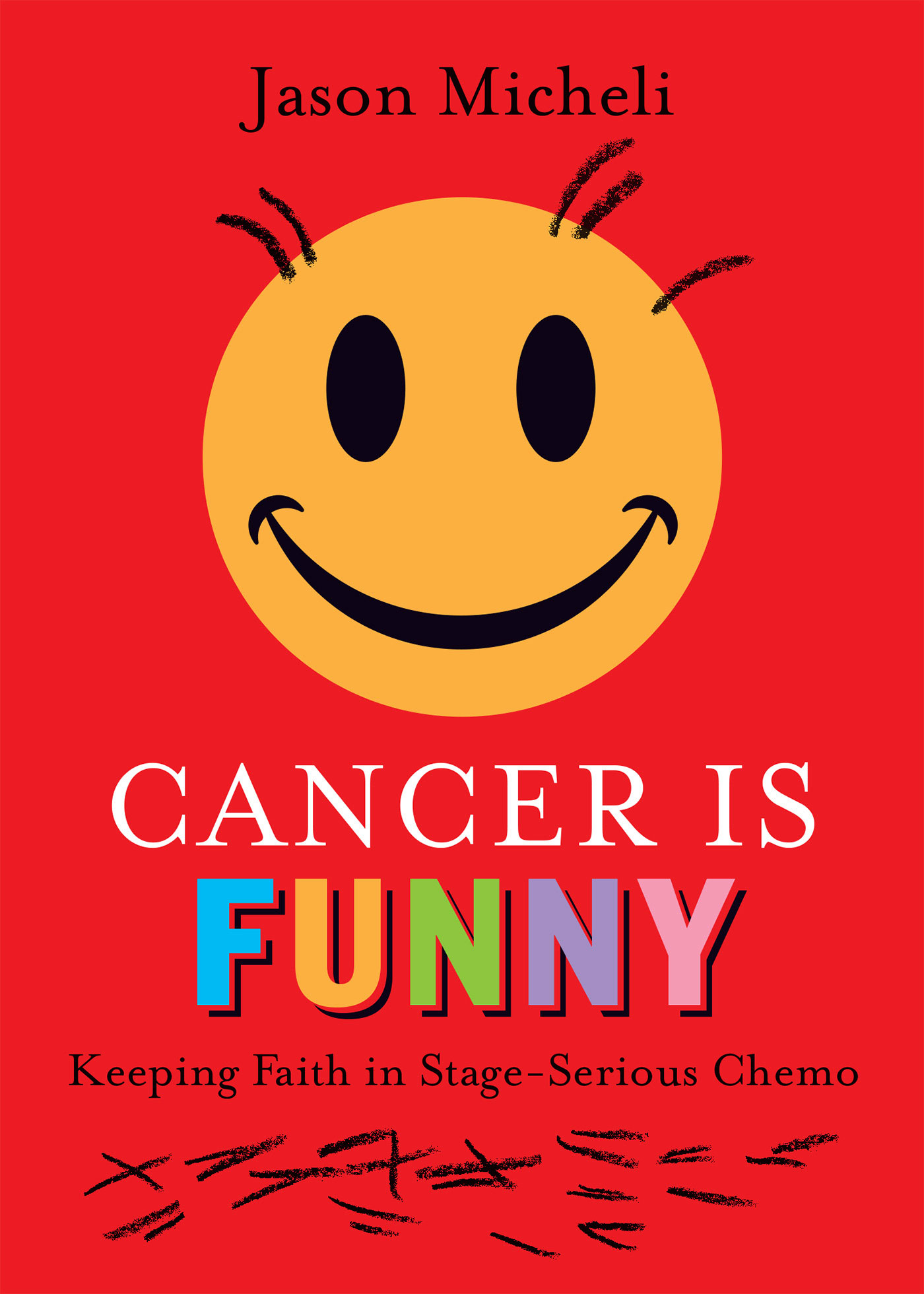 Cancer Is Funny: Keeping Faith in Stage-Serious Chemo Jason Micheli (Fortress) $26.99 First I want to say I hate the title and find it difficult to like a book that is so hard to easily suggest. I know people who are in serious chemo and can’t bring myself to tell them about this. Secondly, if there was an award for worst cover of the year from a serious publisher, I’d nominate this. What in the world were they thinking? It is just stupidly silly, and hard to take seriously.
Cancer Is Funny: Keeping Faith in Stage-Serious Chemo Jason Micheli (Fortress) $26.99 First I want to say I hate the title and find it difficult to like a book that is so hard to easily suggest. I know people who are in serious chemo and can’t bring myself to tell them about this. Secondly, if there was an award for worst cover of the year from a serious publisher, I’d nominate this. What in the world were they thinking? It is just stupidly silly, and hard to take seriously.
Which is why I didn’t list it as one of the best books of the year; the publisher just dropped the ball on the packaging and promotion. But, you know what? Micheli, a United Methodist minister, is a good guy who has been through a lot. He’s a great, energetic writer and his topic is important — not just finding humor in the hardest places, but in coping with life-threatening disease and serious pain. And in this remarkable book he deconstructs all that stuff (in what Morgan Guyton calls “pastoral irreverence”) and brings us what one reviewer calls “astonishing” insights. No lesser theological light — not one known for her hilarity, as far as I can tell — than the thoughtful and classy Fleming Rutledge approves. She says it is “the real thing, people” and calls it “indispensable.”
He is an upbeat, driven, fun writer, and, given that “death had sniffed him over” he is aware of the seriousness of illness, pain, disease. But he does, early in the book, do some fairly serious (although pleasant) analysis of what humor is, what the role of comedy is, the subversive power of laughter. I appreciated that a lot and it helped me realize the theological substance behind his jokes and four letter words.
Listen to Brian Zahnd, author of Beauty Will Save the World, a book about aesthetics, and the the fabulous anti-war A Farewell to Mars:
I don’t know if cancer is funny, but I can tell you that Cancer Is Funny is often hilarious! And the parts of Jason Micheli’s astounding book that aren’t hilarious brim with profound reflections on life, death, God, and the absurd wonder and tragedy of being human. And it doesn’t hurt that the writing is superb. This is not a book for people with cancer, this is a book for people who are mortal.
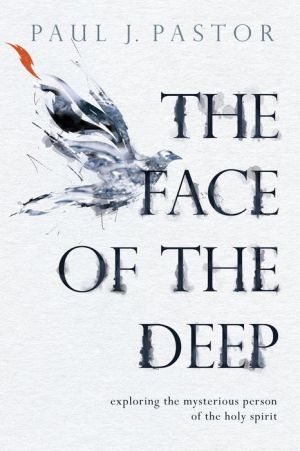 The Face of the Deep: Exploring the Mysterious Person of the Holy Spirit Paul J. Pastor (David C. Cook) $16.99 I have to admit, sinfully quirky reader that I am, that I didn’t read this right away. I was frustrated by this because a blurb on the back says, “Finally, somebody is writing about the Holy Spirit!”
The Face of the Deep: Exploring the Mysterious Person of the Holy Spirit Paul J. Pastor (David C. Cook) $16.99 I have to admit, sinfully quirky reader that I am, that I didn’t read this right away. I was frustrated by this because a blurb on the back says, “Finally, somebody is writing about the Holy Spirit!”
What world does that guy live in, to think nobody is writing about the Spirit — we’ve got dozens of recent books about the Holy Spirit here in the shop; and what sort of pompous copy editor allowed just nonsense to pass? Maybe the editors don’t get out much.
Okay, now that I got that off my chest, I realize, also, that a greatly esteemed older Lutheran writer named Walter Wangerin also endorses this book, saying:
Often, while reading, I had to pause, think, and re-read a passage too rich and too insightful for a single consideration. Anyone who attends closely to Pastor’s book will experience the same inspiring jolts.
And then I saw other remarkably breathy endorsements from good folks I truly admire — Jon Tyson, Karen Swallow Prior, J. A. Swoboda, Katelyn Beaty, Skye Jethani, Jonathan Merritt, Chris Smith, Randy Woodley, Mandy Smith; important authors all. Holy smokes, I realized, something serious, something full of awe and wonder, something vital, is going on here, exploring the Spirit in creation, art, history and theology, too. I loved what John Mark Comer (author of the lively Garden City) says, noting it is:
Creative, thoughtful, rooted, mysterious — it pairs well for a conversation about God’s activity in the world.
And so I lift this up, naming it as a book I wished I had reader sooner, and one that I’ve started and will surely explore in greater care, soon. Highly recommended.
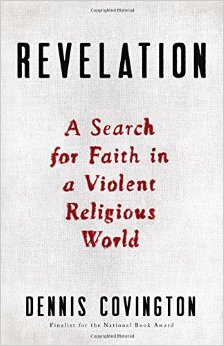 Revelation: A Search for Faith in a Violent Religious World Dennis
Revelation: A Search for Faith in a Violent Religious World Dennis
Covington (Little Brown) $26.00 This was truly one of the most moving books I read all year, keeping me glued to it as I read and thinking about it for months following. I’ve told about it many of the places I’ve spoken and want to honor it here. I’ll just share what I wrote about it last winter when the evening I first saw it:
It is a good day around here when we
get books by authors we admire and whose writing we are just mad about.
It is a great year when Dennis Covington releases a new book. You may
know his stunning memoir called Salvation on Sand Mountain which
explored his reporting on and then involvement with a snake-handling
church in Appalachia, or his eloquent, profound book co-written by his
wife at the time, the extraordinary essayist Vickie Covington, called Cleaving,
about their good but troubled marriage. I loved his wild ride of a
nutty book about trying to re-claim Florida land his dad had been bilked
out of called Red-neck Rivera which below the surface (not unlike the more intense and beautiful Sand Mountain)
seemed to indicate his nearly pathological draw to dangerous stuff. To
say his book writing is “high octane” puts it mildly. And, once again,
in this new one, it seems that he is drawn to danger.
I
got home from Jubilee bleary-eyed, exhausted, with a belly full of bad
road-trip coffee and ears still buzzing from the sound system, and just
wanting to go to bed. We unloaded some stuff back into the store, my
eyes fell on this book on our new release table, and I felt like it was
one of those moments: the new Dennis Covington book! If I start this
now I will be up all night – should I even touch it? Read the first
pages? Covington is an “astonishing” writer and here he is apparently
raising huge questions of doubt and faith and of the role of toxic, even
violent, religion. Another high-octane, truly astonishing writer, Mark
Richard, author of the unforgettable House of Prayer No. 2I,
says, “Dennis Covington empathically inhabits the victims of the
violence he meets, and in a fleeting instance find the grace that
sustains them and the despair that transcends them beyond our reckoning.
Touched by his epistles, we are somehow encouraged, even when all we
have is God.”
Kim
Barnes (another of my favorite writers, another of the most
unforgettable memoirists I’ve ever read) says “From the first sentence
on, you understand what Dennis Covington brings to the page is something
raw, terrifying, brilliant, and necessary. Vivid, tense, and
compelling, Covington’s story bears brave and unflinching witness to one
of the most threatening conflicts of our time.”
I’m telling you, the blurbs on the back of this book themselves might keep you up at night. Listen to Alan Weisman, who writes,
Once again, Dennis Covington, author of the astonishing Salvation on Sand Mountain, rushes
headlong into abysses that the rest of us flee, from the most brutal
spots on earth to the rawest truths in the mirror. His obsessed, haunted
question scours the depths of madness — his, ours, this century’s —
yet somehow salvages faith from the most fearful despair. This brave
book is a Revelation, indeed.
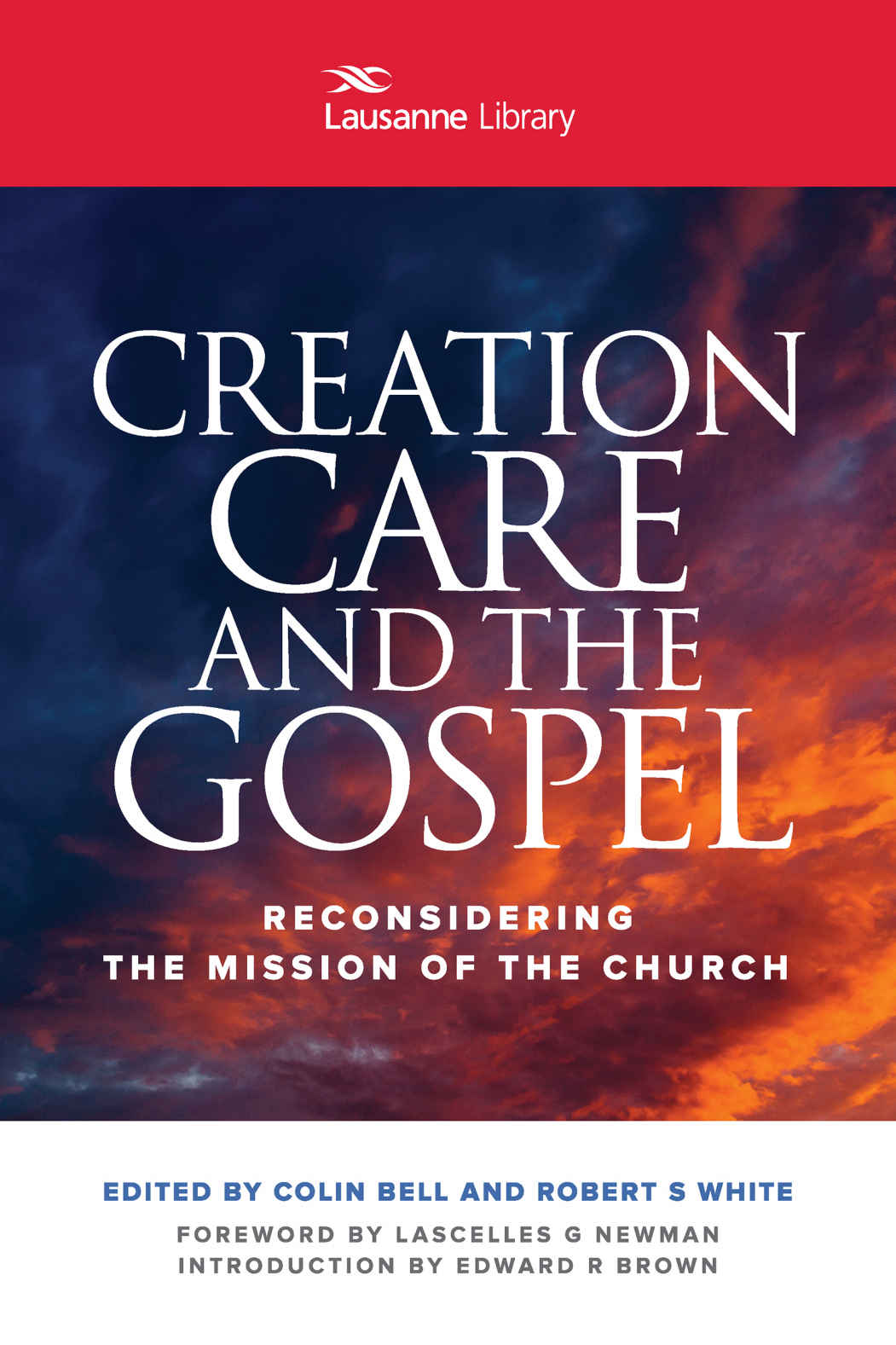 Creation Care and the Gospel: Reconsidering The Mission of the Church edited by Colin Bell and Robert White, introduction by Edward R. Brown (Hendrickson) $29.99 I’ll admit, again, that I haven’t really read this — it came near the end of the year — but I can assure you it is one of the major releases because it is a document and set of study chapters developed by the Lausanne Committee for World Evangelization, the international evangelical mission network, famously founded in 1974 by Billy Graham. Perhaps you’ve seen the Cape Town Commitment, a small book that came out of their 2010 South African gathering. (Lausanne has only met three times in global Congresses (in 1974, 1989, and 2010.) In that Cape Town challenge it named a number of key topics that were to be urgent aspects of their movement’s philosophy of mission. It insisted that creation care was an important, integral aspect of faithful holistic mission and that more work needed to be done to develop a serious theology of environmental concern, emerging from the global church, related to themes of evangelism, justice, spirituality and mission. And so, the Jamaica Consultation was held in late 2012, the “Jamaican Call to Action” was written, and this stunningly comprehensive work emerged from that gathering. We are thrilled to stock it and commend it.
Creation Care and the Gospel: Reconsidering The Mission of the Church edited by Colin Bell and Robert White, introduction by Edward R. Brown (Hendrickson) $29.99 I’ll admit, again, that I haven’t really read this — it came near the end of the year — but I can assure you it is one of the major releases because it is a document and set of study chapters developed by the Lausanne Committee for World Evangelization, the international evangelical mission network, famously founded in 1974 by Billy Graham. Perhaps you’ve seen the Cape Town Commitment, a small book that came out of their 2010 South African gathering. (Lausanne has only met three times in global Congresses (in 1974, 1989, and 2010.) In that Cape Town challenge it named a number of key topics that were to be urgent aspects of their movement’s philosophy of mission. It insisted that creation care was an important, integral aspect of faithful holistic mission and that more work needed to be done to develop a serious theology of environmental concern, emerging from the global church, related to themes of evangelism, justice, spirituality and mission. And so, the Jamaica Consultation was held in late 2012, the “Jamaican Call to Action” was written, and this stunningly comprehensive work emerged from that gathering. We are thrilled to stock it and commend it.
Some of this, of course, has been said before. There are dozens of great books on faith-based creation care, Christian views of environmental stewardship, Biblical studies about Earth-keeping, theological analysis of climate change. many of the authors of the key chapters in this volume have themselves written entire books. This one is unique and particularly significant, though as it brings the weight of the Lausanne movement, the best of world-wide evangelical scholars, and the urgency felt especially in the two-thirds world, to bear on the global environmental crisis.
The book is over 350 pages, with more than twenty major chapters, and 10 remarkable case studies from around the world. Creation Care and the Gospel has within its pages tons of Biblical, theological teaching, lots of great stories — including the fabulous episode told by Susan Emmerich about reconciling Tangier Island fisherfolk and ecological activists in the lower Chesapeake bay, not that far from us here — and a vast array of mission-minded testimony. What God is doing around the world through Christ’s people on every continent is nothing short of breathtaking. This is surely a historic volume, documenting a historic moment in the evangelical movement. Thanks be to God, who so loves the world He made.
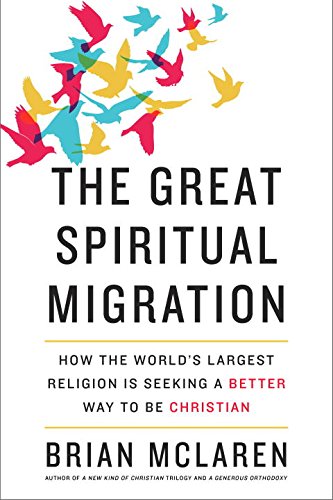 The Great Spiritual Migration: How the World’s Largest Religion is Seeking a Better Way to Be Christian Brian D. McLaren (Convergent) $21.00 I truly enjoyed this book and I think I have read all of Brian’s fascinating, important works. He has shifted in this thinking over time and he has increasingly become known not as emergent or a “new” kind of Christian, but as a progressive, mainline denominational voice. With endorsements on the back from Diana Butler Bass (who says it is his “finest book, a beautiful exploration of a hopeful, joyful, mystical, and just faith…”) and Richard Rohr, Joan Chittister, and Pete Enns, you can see this isn’t some youthful swagger about postmodernism. This is serious stuff, and for those of us within mainline churches, it seems like a fresh way to say what many have said all along. Which is to say this isn’t simple and it is in some ways controversial. I am not at ease with all of it, but I think as a sociologist of religion, a storyteller from the front lines, an evangelist for the commonwealth of God, he is explaining and showing what, in fact, is a reality for many folks — this is their interpretation of faith and it seems reasonable and right and faithful. Sister Joan is right to say the book is, “A refreshingly honest, totally committed, enriching, and profound analysis of the Spiritual Moment that is changing all our lives.” She continues, “If you are concerned — and excited — by what is going on in churches these days, read this book.”
The Great Spiritual Migration: How the World’s Largest Religion is Seeking a Better Way to Be Christian Brian D. McLaren (Convergent) $21.00 I truly enjoyed this book and I think I have read all of Brian’s fascinating, important works. He has shifted in this thinking over time and he has increasingly become known not as emergent or a “new” kind of Christian, but as a progressive, mainline denominational voice. With endorsements on the back from Diana Butler Bass (who says it is his “finest book, a beautiful exploration of a hopeful, joyful, mystical, and just faith…”) and Richard Rohr, Joan Chittister, and Pete Enns, you can see this isn’t some youthful swagger about postmodernism. This is serious stuff, and for those of us within mainline churches, it seems like a fresh way to say what many have said all along. Which is to say this isn’t simple and it is in some ways controversial. I am not at ease with all of it, but I think as a sociologist of religion, a storyteller from the front lines, an evangelist for the commonwealth of God, he is explaining and showing what, in fact, is a reality for many folks — this is their interpretation of faith and it seems reasonable and right and faithful. Sister Joan is right to say the book is, “A refreshingly honest, totally committed, enriching, and profound analysis of the Spiritual Moment that is changing all our lives.” She continues, “If you are concerned — and excited — by what is going on in churches these days, read this book.”
Brian is always winsome, tries to be gracious as he points towards a new way, and is, admittedly (as Fr. Rohr says) “refining the meaning of orthodoxy.”
How so? Does the church, as we Presbyterians say, really believe in ecclesia semper reformanda (the church always reforming) and is this a faithful, healthy shift, or a step away from what God desires for Christ’s Body? What is the migration McLaren is observing and inviting us to?
The book is arranged in three major parts:
Part One is called The Spiritual Migration: From a System of Beliefs to a Way of Life.
Part Two explores The Theological Migration: From a Violent God of Domination to a Nonviolent God of Liberation.
Part Three is earnest and exciting, The Missional Migration: From Organized Religion to Organizing Religion.
There are a few appendices, a “Charter for a Just and Generous Christianity” and “Fourteen Precepts of Just and Generous Christianity.” There are a few good pages well worth pondering where he explores a bit more of what he mean by “beliefs.”
Over and over Brian is told that his expression of faith and his invitation to study the Bible for a just and generous sort of spirituality is the very kind of good news that makes people want to remain in their churches, despite toxic and stupid stuff. In an age when evangelicalism has gotten a bad name and for many, church life is seen as nearly passe, McLaren does us a service by offering this overview of some of the reforms possible — and happening — in various quarters within Christianity. The book is at times provocative and the footnotes are packed with ideas, websites, authors and events to explore, making it a useful tool for some, a way to get “brought up to speed” on this part of the Body and what many are thinking and doing these days. Glad or not, it is one of the important books here in the middle of our new millennial decade. You should read it.
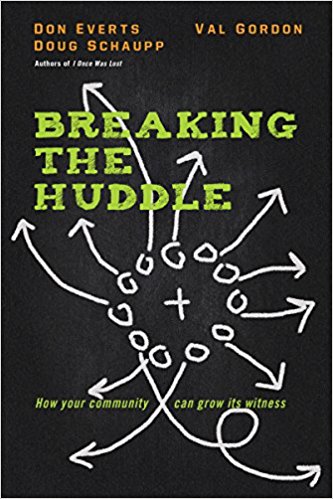 Breaking the Huddle: How Your Community Can Grow Its Witness Don Everts, Val Gordon, Doug Schaupp (IVP) $16.00 About ten years ago a book came out that was essential reading — it remains so, I think — for anyone doing campus ministry or interested in talking about faith with skeptics, seekers, or the ubiquitous un-churched. Co-authored by Don Everts and Doug Schaupp, it was called I Once Was Lost and it was based on massive interviews with un-church college students and those who had come to faith in their college years. It was trying to figure out what emotional, relational, intellectual and other hurdles such young adults had to get over before they could even consider the truth claims about who Jesus was and is. Interestingly, their massive data suggested a process of learning to trust a real Christian — a harder thing then you might suppose — and then several other major steps. These stages, so to speak, towards faith, were then used to help earnest evangelists learn how to more effectively share the gospel with skeptics and postmodern seekers.
Breaking the Huddle: How Your Community Can Grow Its Witness Don Everts, Val Gordon, Doug Schaupp (IVP) $16.00 About ten years ago a book came out that was essential reading — it remains so, I think — for anyone doing campus ministry or interested in talking about faith with skeptics, seekers, or the ubiquitous un-churched. Co-authored by Don Everts and Doug Schaupp, it was called I Once Was Lost and it was based on massive interviews with un-church college students and those who had come to faith in their college years. It was trying to figure out what emotional, relational, intellectual and other hurdles such young adults had to get over before they could even consider the truth claims about who Jesus was and is. Interestingly, their massive data suggested a process of learning to trust a real Christian — a harder thing then you might suppose — and then several other major steps. These stages, so to speak, towards faith, were then used to help earnest evangelists learn how to more effectively share the gospel with skeptics and postmodern seekers.
Well. In this new book these authors revisit those five thresholds that individuals cross when they shift from being skeptics to being followers of Christ and apply these stages to congregational change. What steps do churches and faith communities need to journey through in order to be more effective in their outreach? Admittedly, most of our churches and fellowships are what they call “huddled.” Friendly, of course, but mostly in-house and not too externally focused.
In Breaking the Huddle they show how huddled communities can become witnessing communities and then grow into what they call conversion communities, where “evangelistic growth becomes the new normal.” These steps have been discerned by their research and by their work coaching all kinds of fellowship groups, faith communities and conventional congregations. As Jim Singleton says, “Many books motivate personal witness. This is one of the few books that gets at how to lead a cultural change toward being a community that stimulate s real ongoing conversion.” I think he is right — there are lots of great books about reaching out, about seeing more missionally, about practices that change our church member’s attitudes and work for outreach. But this one is unique, really inviting the whole congregational culture to change. I’m very, very eager to explore this more carefully and can’t wait to hear of congregational study groups that start to use it. By the way, besides the “macro-strategies” they offer for shaking up each of the three kinds of churches, they have lots of online resources too.
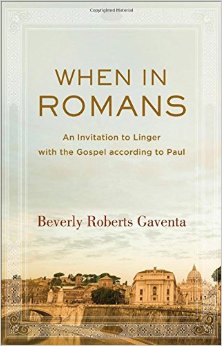 When In Romans: An Invitation to Linger with the Gospel According to Paul Beverly Roberts Gaventa (Baker Academic) $22.99 I mostly wanted to list this because the title was so darn clever and the subtitle was nice — the gospel according to Paul. Dr. Gaventa is a well-known Christian educator and scholar, an Emerita Professor of New Testament at Princeton and now a Distinguished Professor of New Testament at Baylor. In fact this year she has served as the President of the Society of Biblical Literature.
When In Romans: An Invitation to Linger with the Gospel According to Paul Beverly Roberts Gaventa (Baker Academic) $22.99 I mostly wanted to list this because the title was so darn clever and the subtitle was nice — the gospel according to Paul. Dr. Gaventa is a well-known Christian educator and scholar, an Emerita Professor of New Testament at Princeton and now a Distinguished Professor of New Testament at Baylor. In fact this year she has served as the President of the Society of Biblical Literature.
And she does this page-turning book on Romans with some quotes from Springsteen’s “Land of Hope and Dreams.” Brian Blount says it is “easily accessible and utterly indispensable.”
John Buchanan (a widely known Presbyterian and former editor of The Christian Century) says of When in Romans:
Beverly Gaventa has produced that rarest of books, combining careful, exquisite scholarship with her eye for humanizing, delightful detail. Her writing is both sophisticated and accessible as she tackles Paul’s complex notions of individual and cosmic salvation.
And listen to this from none other than Fleming Rutledge who herself has a large collection of sermons on Romans (Not Ashamed of the Gospel) and the magisterial book (a Hearts & Minds 2015 Award Winner) The Crucifixion:
From the beginning of the Christian era until the present day, Paul’s Letter to the Romans has been the source of revolutionary rethinking. Nowhere do we come closer to the radical heart of the gospel. The universal and cosmic notes of the Pauline symphony are sounded in this book by one of our most esteemed interpreters of the apostle’s letters. Beverly Gaventa has written a book for ordinary parish clergy and laypeople that is fun to read and full of spicy references to popular culture, and that will jolt readers into a new appreciation for the great apostle and his unique place in the history of Christian theology.
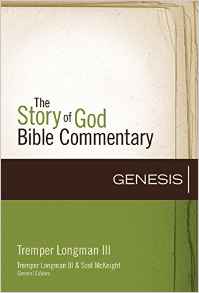
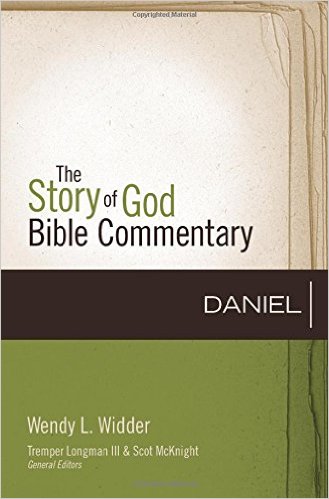 The Story of God Bible Commentary (Zondervan) $29.99 There have been several new ones in this set that have been released this year and I am increasingly impressed. I don’t name these books as some of the important ones of the year because of the authors, really, although they are all stellar. I want to commend Zondervan — and the general editors Tremper Longman and Scot McKnight — for overseeing this ongoing series. It started out a year or two ago with a couple of volumes and I want to celebrate that 2016
The Story of God Bible Commentary (Zondervan) $29.99 There have been several new ones in this set that have been released this year and I am increasingly impressed. I don’t name these books as some of the important ones of the year because of the authors, really, although they are all stellar. I want to commend Zondervan — and the general editors Tremper Longman and Scot McKnight — for overseeing this ongoing series. It started out a year or two ago with a couple of volumes and I want to celebrate that 2016 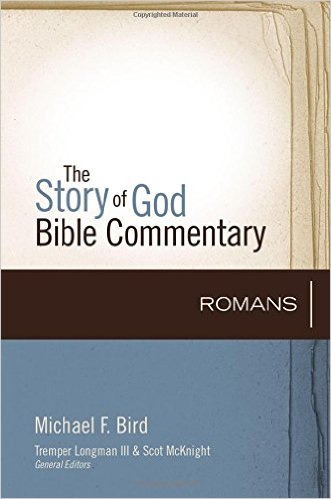
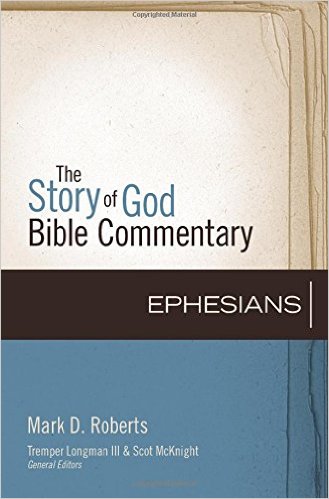 saw a number of new ones in this useful series.
saw a number of new ones in this useful series.
There are a few reasons I really like to recommend the volumes in this series. As the commentary set’s name suggests, there is some effort to place the book of the Bible under consideration within the larger framework of the unfolding canon. That is, it brings the grand Biblical meta-narrative, as they used to say, to the fore, and sees how this historical book is places within the bigger picture. This is immensely important and all too rare. I don’t know how well each volume does this but it is a major feature and quite a feature it is.
Secondly there is this sense of modern application, building bridges, explaining how to live out the text today. Like the wonderful NIV Application Commentary Series that always ends each section with some contemporary application, this set, too, aids the Bible teacher or preacher by offering this “Live the Story” part.
In fact, each Bible pericope in The Story of God Bible Commentary volumes is arranged in three easy-to-use sections designed to help readers live out God’s story. The sections are:
Listen to the Story, Explain the Story, and Live the Story. It seems to me to be the first Bible commentary to offer these features together and we are glad that they are becoming better known.
2016 saw the release of the SGBC Genesis by Tremper Longman, Romans by Michael Bird, Ephesians by Mark D. Roberts, and Daniel by Wendy Widder. Look for several more in 2017, including 1 Peter by Dennis Edwards later this Spring.
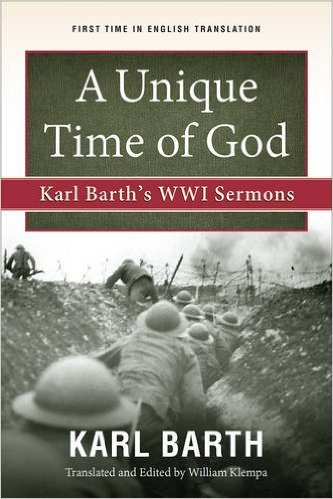 A Unique Time of God: Karl Barth’s WWI Sermons Karl Barth (Westminster/John Knox) $35.00 I don’t know if new stuff by the esteemed and extraordinarily important German theologian is considered by many a “publishing event” but we can’t let this late-in-the-year release slip by without some hubbub. This is the first time these sermons have been published in English and people in the know say that these sermons not only offer great theological and Biblical preaching in the midst of a global crisis but show how these sermons “are the true beginning of Barth’s later theology.”
A Unique Time of God: Karl Barth’s WWI Sermons Karl Barth (Westminster/John Knox) $35.00 I don’t know if new stuff by the esteemed and extraordinarily important German theologian is considered by many a “publishing event” but we can’t let this late-in-the-year release slip by without some hubbub. This is the first time these sermons have been published in English and people in the know say that these sermons not only offer great theological and Biblical preaching in the midst of a global crisis but show how these sermons “are the true beginning of Barth’s later theology.”
Here is what the publisher says:
Barth saw the war as “a unique time of God,” believing it to represent God’s judgment on militarism. These sermons reveal a deep strain of theological wrestling with the war’s meaning, as Barth comes to see the conflict as the logical outcome of all human attempts to create God in our own image. As it demonstrates a decisive shift in Barth’s early theology, this volume is essential for anyone who wishes to understand the twentieth century’s greatest theologian.
David Demson of Wycliffe College at the University of Toronto, continues,
Through them [these sermons] a revolutionary theology was born our of the necessity and struggle of proclaiming the Christian message during the first few months of the Great War. In these sermons, the pastoral and theological strengths of the young Barth are already present. Also evident are the liberal emphasis of nineteenth-century theology and the beginning of Barth’s negation of them. Klempas translation sets in high relief a major milestone in twentieth-century theology.
Live 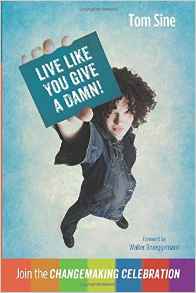 Like You Give a Damn! Join the Changemaking Celebration Tom Sine (Cascade Books) $24.00 I know the title can be off putting, but I’m telling you — as I did when I first celebrated this in our BookNotes newsletter review — this is well worth reading, a major call to action and a remarkably buoyant reminder of how God is alive and well, inspiring many to do such good, change-making stuff. It brings to our attention a new generation of activists and public servants, missionaries and social entrepreneurs. It is just jam-packed with stories and examples and cannot help but make you smile — and maybe make you wonder how you, too, might be involved. As Walter Brueggemann says in his remarkable endorsement, “Such as fresh, imaginative engagement will surely yield a “well done” from the Lord of the church who makes all things new.”
Like You Give a Damn! Join the Changemaking Celebration Tom Sine (Cascade Books) $24.00 I know the title can be off putting, but I’m telling you — as I did when I first celebrated this in our BookNotes newsletter review — this is well worth reading, a major call to action and a remarkably buoyant reminder of how God is alive and well, inspiring many to do such good, change-making stuff. It brings to our attention a new generation of activists and public servants, missionaries and social entrepreneurs. It is just jam-packed with stories and examples and cannot help but make you smile — and maybe make you wonder how you, too, might be involved. As Walter Brueggemann says in his remarkable endorsement, “Such as fresh, imaginative engagement will surely yield a “well done” from the Lord of the church who makes all things new.”
I trust you know Sine’s many other books, including his much celebrated and lasting collection of stories called The Mustard Seed Conspiracy written in maybe the late 70s. He did a fresh look and update in 2008 called The New Conspirators: Creating a Future One Mustard Seed at a Time that we still stock. In a way, this is more of that magic — serious cultural analysis, ear-to-the ground discernment of what God’s people are doing, and an invitation to join up with a younger movement of those making a difference.
By the way, I don’t think you will find a book this year that has so many rave reviews, so many endorsements and blurbs, so many wonderful folks celebrating the life and work of Tom Sine. You should get this. And pass it on. You can fan the flames of this changemaking revolution!
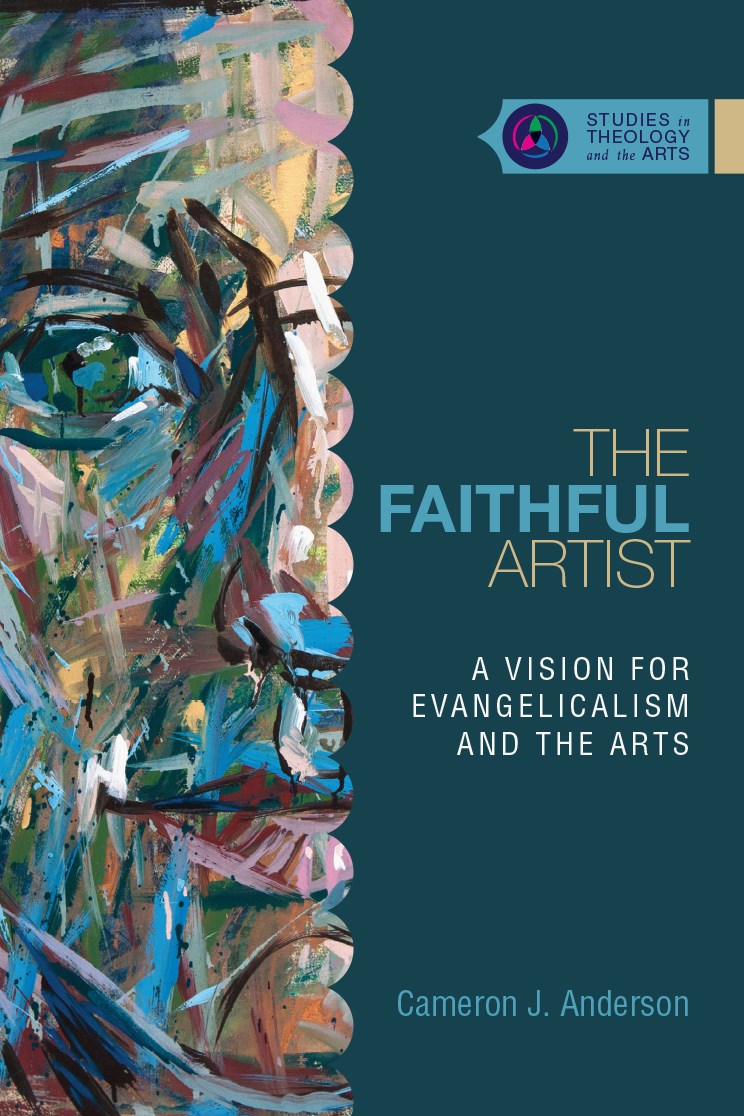 The Faithful Artist: A Vision for Evangelicalism and the Arts Cameron J. Anderson (IVP Academic) $26.00 Published in cooperation with CIVA (Christians in the Visual Arts) this is the second important volume in their newly launched “Studies in Theology and the Arts” series. And, wow, is it important. It surely is a notable thing that CIVA’s President, Cam Anderson, has finally done a book. It has been long-awaited and he is uniquely situated to offer such a fresh, well informed view. Further, it is a notable thing that this series has gotten launched. (The first volume causes a bit of a stir — maybe you read my long review of Modern Art and the Life of a Culture: The Religious Impulses of Modernism by Jonathan Anderson & William Dyrness.) With blurbs on these from the likes of major scholars of aesthetics like Nicholas Wolterstorff and Calvin Seerveld, and wonderful patrons and practitioners like Luci Shaw and Makoto Fujimura, you can see that these are essential books for the library of anyone thinking seriously about faith and the arts.
The Faithful Artist: A Vision for Evangelicalism and the Arts Cameron J. Anderson (IVP Academic) $26.00 Published in cooperation with CIVA (Christians in the Visual Arts) this is the second important volume in their newly launched “Studies in Theology and the Arts” series. And, wow, is it important. It surely is a notable thing that CIVA’s President, Cam Anderson, has finally done a book. It has been long-awaited and he is uniquely situated to offer such a fresh, well informed view. Further, it is a notable thing that this series has gotten launched. (The first volume causes a bit of a stir — maybe you read my long review of Modern Art and the Life of a Culture: The Religious Impulses of Modernism by Jonathan Anderson & William Dyrness.) With blurbs on these from the likes of major scholars of aesthetics like Nicholas Wolterstorff and Calvin Seerveld, and wonderful patrons and practitioners like Luci Shaw and Makoto Fujimura, you can see that these are essential books for the library of anyone thinking seriously about faith and the arts.
We were glad to celebrate them when they came out and I was remiss not to list them in our Best of 2016 lists. These really, really are significant and, for those who are glad about God’s redemptive work among the modern arts community, and folks like CIVA, they are a joy to behold and a treat to own. Highly recommended.
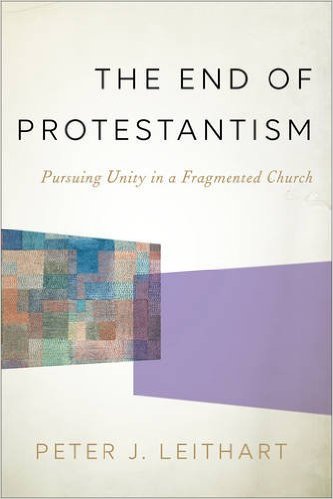 The End of Protestantism: Pursuing Unity in a Fragmented Church
The End of Protestantism: Pursuing Unity in a Fragmented Church
Peter J. Leithart (BakerAcademic) $21.99 Here is what I wrote last fall when this book was released: Leithart may be one of the
most interesting theological voices writing today, and his last few
books have placed him into that rare circle of the “must read”
theological scholars. Anyone interested in the nature of the church, the
role of confessional truths, and the call to ecumenism will want to
have this. I surely hope many are drawn to it as the unity of the Body
of Christ is Jesus’s own stated passion. The rave reviews of The End of Protestantism
are themselves so stimulating that it makes me really, really eager to
read this carefully. (There are woefully few good books on ecumenical
theology from anybody, let alone from such a rigorous evangelical.
Thanks be to God for this kind of serious, faithful work.)
Stanley
Hauerwas says that “Leithart simply cannot write a dull book. He cannot
because he has the courage and intellect to go to the heart of the
matter.” Richard Mouw, in a blurb on the back, admits that he had given
up finding “an alternative to the tribalism of divisive
denominationalism and the ‘unity’ efforts of mainstream ecumenism.”
Leithart convinced him that he gave up too quickly; Mouw continues: “This
groundbreaking book combines exciting ecclesiological explorations with
some practical steps for moving forward.”
The fabulous Hans Boersma
calls it “urgent and fearless.” I commend it urgently and fearlessly to
mainline Protestants, evangelicals of all sorts and also to Roman
Catholics and the Orthodox. I fear we won’t sell any at all, though,
but let us pray that we do. We’ve got a stack here. I hope you know this means a lot to us. We should all care about the broader church. I hope this one helps.
Well, there were others that we liked, that we enjoyed selling, that we promoted with some vigor. But I’ve got to stop… Thanks for listening in and for sending orders our way. We need the business and are grateful for your support.
BookNotes
DISCOUNT
ANY ITEM MENTIONED
10% off
order here
takes you to the secure Hearts & Minds order form page
just tell us what you want
inquire here
if you have questions or need more information
just ask us what you want to know
Hearts & Minds 234 East Main Street Dallastown, PA 17313 717-246-3333
